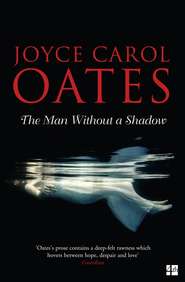По всем вопросам обращайтесь на: info@litportal.ru
(©) 2003-2024.
✖
Carthage
Автор
Год написания книги
2018
Настройки чтения
Размер шрифта
Высота строк
Поля
Suddenly it had become 8:20 A.M. So swiftly, the night had passed into dawn and now into a sunny and shimmering-hot morning.
The privacy of the night. The exposure of the morning.
Arlette asked, in a shaky voice, “Do you think that Cressida and Brett might have gone away together?—or, he took her somewhere? To hurt her? To embarrass us? Zeno?”
“Cressida is nineteen. She’s an adult. If she chooses to stay away overnight, that’s her prerogative.”
Zeno spoke harshly, ironically. He had not the slightest faith in what he was saying but he believed these words must be reiterated.
Arlette clutched at his arm. Arlette’s fingers dug into his arm.
“But—if she didn’t choose? If someone has hurt her? Taken her? We have to help our daughter, Zeno. She has no one but us.”
Unspoken between them was the thought She isn’t really an adult. She is a child. For all her pose of maturity, a child.
There was no choice now, no postponing the call, even as Zeno stood in the driveway staring with eyes that felt seared, ravaged with such futile staring in the direction of Cumberland Avenue as into an abyss out of which at any moment—(feasibly! Not illogically and not impossibly!—for as a young aggressive attorney Zeno Mayfield had often conjured the attractive possibilities of alternate universes in which alternate narratives revealed his [guilty] clients to be “innocent” of the charges that had been brought against them)—his daughter Cressida might appear; no choice, he knew, except to contact law enforcement; calling the Beechum County Sheriff’s Department and asking to speak to Hal Pitney who was a lieutenant on the force, not a close friend of Zeno Mayfield’s but an old friend from Zeno’s political days and, he wanted to think, a reliable friend. With forced calmness he told Hal that he knew, it might seem premature to be reporting his daughter missing, since Cressida was nineteen, and not a child, but the circumstances seemed to warrant it: she’d been gone overnight, she was definitely not a person to behave irresponsibly; they had learned that she’d been seen at the Roebuck Inn the previous night, alone; then, later, in the company of several men of whom one was Brett Kincaid. (Pitney surely knew of Corporal Brett Kincaid, from stories in the local media.) Zeno said they’d called Cressida’s cell phone repeatedly and they’d called virtually everyone in Carthage who knew her, or might know of her—she seemed to have vanished.
Zeno said he’d gone to Kincaid’s house. And Kincaid was missing, too.
Zeno spoke rapidly and, he hoped, persuasively. He was not prepared for Hal Pitney telling him that, though they knew nothing about his daughter, it had happened that Brett Kincaid had been brought into headquarters that morning, less than an hour before. He’d been reported by hikers seemingly incapacitated in his Jeep Wrangler, that appeared to have skidded partway off the Sandhill Road, just inside the Nautauga Preserve. There’d been no one with him but there’d been “bloody scratch or bite marks” on his face and bloodstains in the front seat of his vehicle; he’d been “agitated” and “belligerent” and tried to fight the deputy who restrained him, cuffed him and brought him into headquarters.
“He isn’t cooperating. He’s pretty much out of it. Hungover, and sick to his stomach, and scared. He didn’t seem to know where he was, or why, or if anyone, like a girl, had been with him. We’ve sent two deputies back to investigate the scene, and his Jeep. We’re questioning him now. You’d better come to headquarters, Zeno. You and your wife. And bring photographs of your daughter—the more recent, the better.”
This news was so utterly unexpected, Zeno had to stagger into the house to fumble for a chair, a kitchen chair, and sit down, heavily; he felt as if he’d been kicked in the gut, the air slammed out of him. So weak, so frightened, he was scarcely able to hear Arlette pleading with him—“Zeno, what is it? Have they found her? Is she—alive? Zeno?”
Time moved now in zigzag leaps.
Once Zeno made this call. Once what had been a private concern became irreversibly public.
Once their daughter was publicly designated missing.
Once they’d brought photographs of the missing daughter to law enforcement officers, to be shared with the media, broadcast over TV and on the Internet and printed in newspapers.
Once they’d described her. Once they’d described her in all ways they believed to be crucial to finding her.
Then, time passed with dazzling swiftness even as, perversely, time passed with excruciating slowness.
Swift because too much was crammed into too small a space. Swift like a nightmare film run at a high speed for a cruel-comic effect.
Slow because for all that was happening very little that was crucial seemed to be happening.
Slow because despite the many calls they were to receive in the course of a day, two days, several days, a week, the call they awaited, that Cressida had been found, did not come.
Alive and well. We have found your daughter—alive and well.
This call, so desperately wished-for, did not come.
(AND THEY KNEW, each hour that their daughter was missing there was more likelihood that she’d been injured, or worse.)
(Each hour that Brett Kincaid refused to cooperate, or was unable to cooperate, there was more likelihood that she’d been injured, or worse, and less likelihood that she would be found.)
PROVIDING LAW ENFORCEMENT OFFICERS with photographs of Cressida.
Spreading a half-dozen photos across a table.
Startling to see their daughter gazing up at them.
Wariness in Cressida’s eyes, thin-lashed dark eyes gleaming with irony and the faintest tincture of resentment as if she’d known that strangers would be staring at her, memorizing her face, without her permission.
In none of the photos was Cressida smiling. Not since childhood had Cressida been recorded smiling.
Arlette had wanted to explain—Our daughter was not an unhappy person. But she refused to smile when she was photographed. Not even in her high school yearbook is she pictured smiling. And this is because . . .
But Arlette could not utter these words. Her throat closed, she could not.
. . . she’d said, you know that one of the pictures will be for the obituary. So you can’t ever smile. You’d be a fool to smile at your own funeral.
IN THE LATE MORNING of Sunday, July 10, 2005, the search for the missing girl in the Nautauga Preserve began and continued until searchers were obliged to leave the park, at dusk; it was continued the next morning, until dusk; and the next morning, until dusk.
The search differed considerably from more routine searches in the vast Preserve for lost hikers, campers, mountain climbers, numbering quite a few in the course of an average summer: for it was believed that this missing girl might have been assaulted—raped, killed?—by a man.
The search was complicated by the possibility that the missing girl had been dumped into the Nautauga River, and her body carried far downstream.
Yet, morale was high. Especially among those volunteer searchers who knew Cressida Mayfield and the (younger, female) park rangers who were determined to find the girl, missing in their own territory.
It had been eleven years since anyone had been lost in the Preserve and had not been found alive; in that case, involving a young boy believed to have run away from home, in the winter, the boy’s body wasn’t found until the following spring.
In the course of the search a miscellany of castaway items was found—rotted and desiccated articles of clothing including underwear (both men’s and women’s); single gloves, mittens; single shoes, hiking boots, and belts; mangled hats; plastic bottles, cans, and Styrofoam; maps of the Preserve, hiking books, bird books, children’s toys, a single headless doll terrifying to the volunteer searcher who discovered it believing it to be, for a moment, a headless human infant.
Also, scattered bones determined to be the bones of animals or birds.
Here and there, a dead, rotting animal carcass like the partially devoured doe discovered by Zeno Mayfield, that seemed to have caused the father of the missing girl to collapse in a paroxysm of exhaustion and despair.
God if I could trade my life for hers. If that were possible . . .
SO MANY VEHICLES parked in the Mayfields’ driveway, and along Cumberland Avenue, if the missing girl had arrived home she’d have thought it was a festive occasion.
Muttering out of the side of her mouth, a droll remark her mother could almost hear—What’s the big deal? Juliet’s getting engaged—again?
Bright TV camera lights in the living room as Arlette and Zeno Mayfield of Cumberland Avenue, Carthage, parents of the missing girl, were being interviewed by local TV personality Evvie Estes for WCTG-TV 6 P.M. news.
Arlette hadn’t been able to speak. Zeno had done all the talking.
Of course, Zeno Mayfield was very good at talking.
His voice had quavered only slightly. His eyes pouched in tiredness were damp and seemed to have no clear focus.
But he’d showered, and shaved, and put on clean pressed clothes, and his thick-tufted hair had been brushed properly. He knew to speak to the TV audience by way of the TV interviewer and he knew not to be nettled or discomfited by certain of the woman’s questions.











